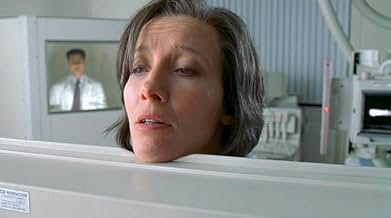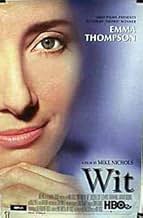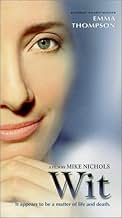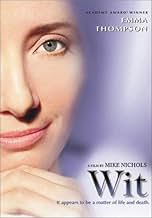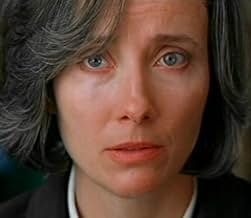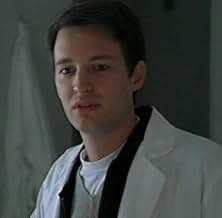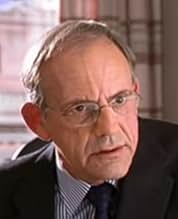A renowned professor is forced to reassess her life when she is diagnosed with terminal ovarian cancer.A renowned professor is forced to reassess her life when she is diagnosed with terminal ovarian cancer.A renowned professor is forced to reassess her life when she is diagnosed with terminal ovarian cancer.
- Director
- Writers
- Stars
- Won 3 Primetime Emmys
- 13 wins & 21 nominations total
- Nurse
- (as Su-Lin Looi)
- Fellow 1
- (as Harry Dillon)
- Director
- Writers
- All cast & crew
- Production, box office & more at IMDbPro
Featured reviews
Vivian Bearing is a professor of English Literature, specializing in the work of Seventeenth Century poet John Donne. Hers is a scholarly life, and she is secure with her place in it; not yet fifty, she has achieved a level of comfort with herself, as well as her work, especially in the class she teaches on Donne. With her students she is a demanding taskmaster and does not suffer fools, nor students who opt for more immediate pleasures over Donne, refusing to accept youthful zeal as an excuse for academic impropriety. In her classroom, she insists that those in attendance rise to her level; she does not stoop to conquer.
Then, with the words of Dr. Kelekian, her world abruptly changes. At first, wrapped in intellectual armor, she finds at least some comfort and respite in her beloved Donne, but she soon finds that the pursuits of the mind, even leavened with a healthy ego, attain a diminished capacity within the environs of a ravaging disease. The eternity of the hospital affords her much time for reflection, and as her illness progresses she undergoes a change in perspectives; taking stock, she considers such things as the aloof manner she affected that served no purpose other than to distance her from her students. And she thinks about it now, not with regret, but differently; her intellectual acumen no longer separates her from her students, nor affords her a lofty perch from which she may sit in judgment. She understands, at last, that she is not so different from them after all. For as she discovers to her considerable dismay-- pain is the great equalizer.
Written by Nichols and Thompson, the screenplay is based on the play by Margaret Edson. The story unfolds like a living diary, as Vivian addresses the viewer directly, with a descriptive narrative that leaves little to the imagination. Graphically real and unrelenting, it is a riveting chronicle that will hold you in thrall from beginning to end and beyond-- because this experience does not end when the screen goes dark; it's something that is going to be with you for a long time afterwards, so be prepared. And the reason this will linger in your memory is that it's a contemplation of a reality that is horrendous beyond imagination. This is that thing that always happens to someone else, but never to `me,' and to be put in the room with someone to whom the unthinkable has happened-- to be up close and personal with it-- is emotionally devastating. This is a true horror story beyond anything Stephen King could write, because this is `real.' What happens to Vivian Bearing is something that happens to people all the time, and there has never been a film before or since that will put you more in touch with what it feels like, from the incredulity born at the moment of diagnosis to the acceptance of the reality of it. And it has nothing to do with courage; it is not about that at all. It's about knowing that you are going to have to do this thing that you least in the whole world want to do-- and that you have no choice in the matter.
This film is a veritable showcase for the incredible talent of Emma Thompson, who gives a performance that is so remarkable there are not enough superlatives to do it justice. Ineligible for Oscar consideration as this film was made for television (HBO), her performance nevertheless is as Oscar worthy as they come (even more impressive than her Oscar winning performance as Margaret in `Howard's End,' which was nothing less than a study in perfection). As Vivian Bearing, Thompson is absolutely mesmerizing-- you simply cannot take your eyes off of her for even a moment. There are times when you want to look away, to avert your eyes because it's just too painful to watch, but you can't. Once you begin this journey you are bound to her for better or worse. You suffer with her through the physical pain, as well as through the base indignities to which she is subjected as a matter of course by the doctors and care givers who simply do not respond to the humanity of the person in their care; a sad commentary, to be sure, but so true.
What really marks Thompson's performance as so extraordinary, however, is the fact that as you watch the drama unfold, you forget this is an actor playing a role; rather, this is a very real person you are watching-- a person named Vivian Bearing who is dying of cancer.
The supporting cast includes Eileen Atkins (E.M. Ashford), Audra McDonald (Susie), Jonathan M. Woodward (Jason) and Harold Pinter (Vivian's Father). An emotionally absorbing drama that redefines empathy and compassion, `Wit' will make you feel alive like never before, and thankful for each and every day that you wake up healthy. It's a film that will enrich your life. 10/10.
Six years ago I invited the ten medical students in my history taking group to view the film together in a setting away from the school. I have since repeated this twice yearly with each of the small groups under my charge. I made one big mistake the first year. After the movie ended I turned on the lights while the credits were running, oblivious to the sniffing and outright weeping on the part of the freshman medical students. Since then I've permitted the credits to run completely before turning on the lights. There is generally a delay of up to five minutes before any of them are able to say anything.
The student response has been uniform. Gratitude for having seen the film, awe of the realities of the profession they have chosen to enter and appreciation for the chance to come to a deeper understanding of their own selves and motivations for entering medical school.
Eileen Atkins is absolutely superb as Evelyn Ashford, PhD. Her scenes are brief but they bring the deeply religious underpinnings of the film to the fore. Her first scene, in which she recites the final stanza of Donne's Holy Sonnett X, (a scene which gave the movie its title) contrasts with the tender love in Vivian's hospital room. Her reciting of the poetry is astonishing. It was not until the sixth or so viewing (I've lost count) that I realized her parting words, "May the angels lead you to Paradise. . . " were the English translation of In Paradisum from the Roman Catholic funeral liturgy. That was one time when my tears joined the students.
Anyone working in medicine; students, residents, nurses and nursing students, aides and so on, should watch this movie. I generally used the class the day following the viewing for a discussion of the movie, the bedside manner of the docs, nurses, techs and so on as well as what feelings the movie stirred in them. The conversations have been memorable.
This is a movie that is not to be missed. It is tragic that it was made for television by HBO rather than given general theatrical release. Many fewer people have seen it is a result.
Vivian is an 'experiment' dying alone. I can still recall the relief on the face of my mother when I brought up her imminent death. She was afraid of making ME fearful. I was privileged to share my mother's dying. She shared moments of regret, painful happenings and joyful events. It was one of the best things I have done as a human being.
Vivian is clearly relieved to 'know the score' when Susie tells her that medicine will not save her. Susie gives the dying Vivian, medicine of compassion. She touches her and thereby acknowledges her as a human being.
Enter the professor who leads Vivian to the moment of death. There is no need for intellectual poetry or sparring. Instead, the professor lies on the death bed holding and supporting her friend. Tears fall from Vivian's eyes, the professor merely confirms the difficulty. The children's story is read and the professor offers her opinion - It is an allegory of a soul. We do not know if Vivian supports this statement. We only know that she dies with the knowledge that she is loved.
"Out of the mouth of babes," is a scriptural quote that confirms the wit of simplicity. I, personally, needed the bunny story. However, many children's stories have incisive clues to live's mysteries.
I am puzzled about the negative comments. Have any of these writers witnessed dying? Why do so many people negate the virtues of kindness, sympathy, touch, love, etc with weakness or by a wave of his/her hand dismiss it as 'boring.' This was not a boring movie. If you saw it this way, you missed the point. Come back, say 10-20 years from now and review it again.
Emma Thompson puts on a superb performance as Vivian Bearing (a Professor of English Literature specializing in the poetry of John Donne,) who leads us through the last months of her life in narrative style.
Diagnosed with terminal ovarian cancer, Bearing agrees to experimental treatments involving powerful doses of chemotherapy. As we see her gradually losing her fight, Thompson convincingly portrays her emotional and physical torment and pain. Audra McDonald is well cast as the compassionate nurse (Susan) assigned as Bearing's primary care giver, who tries to ensure that, in the face of the doctors' temptation to continue to use Bearing as a guinea pig for their research, she will be treated with dignity and respect in her last days. John Woodward is quite believable as a young cancer researcher (Dr. Jason Posner) who really seems to see dealing with patients as an inconvenience that takes time away from what's really important to him, and his rather emotionless and awkward interplay with Bearing suits the character perfectly; a testimony to Woodward's talent.
This movie offers a powerful commentary on the cold and rather antiseptic environment of hospitals, in which patients are seen more as learning opportunities than people. The poetry of John Donne, interspersed throughout the movie as a source of strength for Bearing, is well used.
There's very little to criticize about this movie. Christopher Lloyd (cast in a rare serious role as Dr. Kelekian, the doctor in charge of Bearing's case) comes across as a bit flat, but the role is a relatively small one, and this doesn't detract much from the story. I also found the flashback scenes to be a bit distracting, but these have to be seen in context: this movie is based on an original stageplay written by Margaret Edson, and these scenes would look quite natural in that environment. I also thought the movie went on about five minutes too long. The last scene to me was unnecessary. I personally would have liked to have seen the movie end with the touching visit by Bearing's former Professor. We'd been put through the ringer enough, and didn't need the troubling last few minutes. These are just minor quibbles, though, about a truly great movie.
It's powerful, well acted, well put together. It could be disturbing to some people uncomfortable with illness and death, but it is an educational experience just to watch. I give it 9/10.
Did you know
- TriviaThis movie is often shown at medical colleges as an example of how doctors and researchers should not behave.
- GoofsDuring her exam with the young internist, her arms alternate repeatedly from being completely under the sheet, to being folded together on top of the sheet.
- Quotes
E.M. Ashford: Do you think that the punctuation of the last line of this sonnet is merely an insignificant detail? The sonnet begins with a valiant struggle with Death calling on all the forces of intellect and drama to vanquish the enemy. But it is ultimately about overcoming the seemingly insuperable barriers separating life death and eternal life. In the edition you choose, this profoundly simple meaning is sacrificed to hysterical punctuation.
E.M. Ashford: And Death, Capital D, shall be no more, semi-colon. Death, Capital D comma, thou shalt die, exclamation mark!
E.M. Ashford: If you go in for this sort of thing I suggest you take up Shakespeare.
E.M. Ashford: Gardner's edition of the Holy Sonnets returns to the Westmoreland manuscript of 1610, not for sentimental reasons I assure you, but because Helen Gardner is a scholar.
E.M. Ashford: It reads, "And death shall be no more" comma "death, thou shalt die." Nothing but a breath, a comma separates life from life everlasting.
E.M. Ashford: Very simple, really. With the original punctuation restored Death is no longer something to act out on a stage with exclamation marks. It is a comma. A pause.
E.M. Ashford: In this way, the uncompromising way one learns something from the poem, wouldn't you say? Life, death, soul, God, past present. Not insuperable barriers. Not semi-colons. Just a comma.
- SoundtracksSerenade Adagio
String Quartet #15 (2nd Movement)
Written by Dmitri Shostakovich (as Dimitri Shostakovitch)
Performed by The Manhattan String Quartet
Courtesy of Ess.a.y Recordings
Details
- Runtime1 hour 39 minutes
- Color
- Sound mix
- Aspect ratio
- 1.85 : 1


